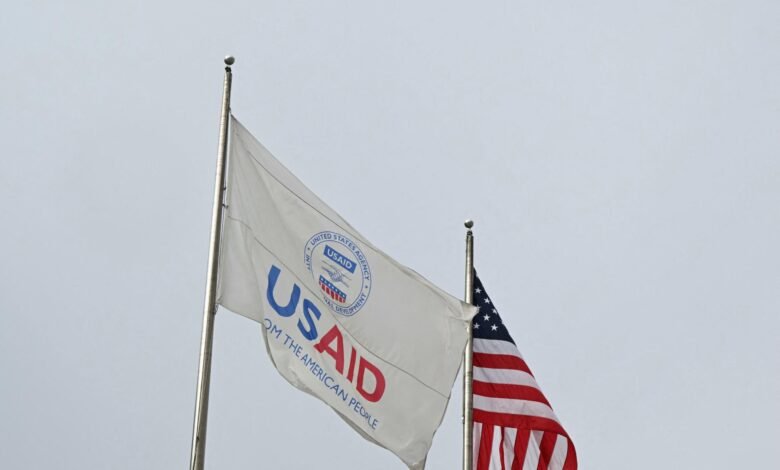
President Donald Trump’s decision to cease US foreign aid and funding to Pretoria due to its new land-expropriation law means that South Africa will need to find 7.5 billion rand ($405 million) to keep the country’s long-standing HIV programs running smoothly.
Health Minister Aaron Motsoaledi said MPs in Cape Town on Wednesday that the authorities would need 2.9 billion rand ($156 million) to cover operating expenses in addition to the 4.6 billion rand ($242 million) required for staffing.
Millions of lives have been saved throughout Africa for more than 20 years thanks to US funding from the President’s Emergency Plan for Aids Relief, or Pepfar. Important fields including data gathering, research, communication, and surveillance are all impacted by the funding interruption.
Nearly 13% of South Africans, or 7.8 million people, are infected with the virus that causes AIDS, which is the largest HIV epidemic in the world. The HIV-AIDS program in South Africa receives over a quarter of its financing from Pepfar, which supports 27 of the 52 health districts in the country.
Even though there has been significant progress in combating the HIV epidemic, it can be difficult to get people back on treatment after an interruption in services, and they run the risk of becoming contagious again if they don’t.
Without humanitarian programs, the Andelson Office of Public Policy estimates that over 230 newborns in South Africa will be born infected with HIV every day.
Also Read: USAID releases Ksh.120 million in aid for over 20K households in Makueni
Infants who are infected at birth are at increased risk of dying and will need to take antiretroviral medication for the rest of their lives. In most cases, the disease is lethal without such treatment.
“Taking the foot off the pedal on surveillance, research, communication and data collection harms the global community almost more than individuals in individual countries,” said Linda-Gail Bekker, chief executive officer of the Desmond Tutu Health Foundation in Cape Town.
Additionally, the likelihood of other infectious illnesses spreading increases in the absence of a robust HIV program.
“Infectious diseases often track together, so the first co-infection that I worry a great deal about is tuberculosis,” said Bekker. “It’s an airborne condition. It has no borders.”






Very interesting info!Perfect just what I was looking for!
Hi there, just became alert to your blog through Google, and found that it’s really informative. I’m gonna watch out for brussels. I’ll appreciate if you continue this in future. A lot of people will be benefited from your writing. Cheers!
Definitely believe that which you stated. Your favorite reason appeared to be on the web the easiest thing to be aware of. I say to you, I definitely get annoyed while people think about worries that they just do not know about. You managed to hit the nail upon the top as well as defined out the whole thing without having side effect , people could take a signal. Will probably be back to get more. Thanks
A formidable share, I just given this onto a colleague who was doing a little bit evaluation on this. And he in actual fact bought me breakfast as a result of I found it for him.. smile. So let me reword that: Thnx for the deal with! But yeah Thnkx for spending the time to debate this, I feel strongly about it and love reading more on this topic. If attainable, as you grow to be experience, would you mind updating your weblog with more details? It is highly helpful for me. Big thumb up for this weblog put up!
Fantastic site. Plenty of useful information here. I am sending it to some friends ans also sharing in delicious. And of course, thanks for your effort!
Hey very nice website!! Man .. Excellent .. Wonderful .. I will bookmark your site and take the feeds additionallyKI am glad to seek out a lot of useful information here in the post, we need develop extra strategies on this regard, thanks for sharing. . . . . .
Good day! Would you mind if I share your blog with my myspace group? There’s a lot of people that I think would really appreciate your content. Please let me know. Cheers
I haven?¦t checked in here for a while as I thought it was getting boring, but the last several posts are good quality so I guess I?¦ll add you back to my everyday bloglist. You deserve it my friend 🙂
We are a group of volunteers and opening a brand new scheme in our community. Your website offered us with helpful info to paintings on. You’ve performed a formidable job and our entire group can be thankful to you.
It is in point of fact a great and useful piece of info. I¦m satisfied that you simply shared this helpful info with us. Please stay us informed like this. Thank you for sharing.
Thank you for every other informative web site. Where else may I am getting that type of information written in such a perfect approach? I’ve a mission that I’m just now operating on, and I have been on the look out for such info.
I really like your writing style, superb information, regards for posting : D.
Nice post. I learn something more challenging on different blogs everyday. It will always be stimulating to read content from other writers and practice a little something from their store. I’d prefer to use some with the content on my blog whether you don’t mind. Natually I’ll give you a link on your web blog. Thanks for sharing.
Thank you for sharing excellent informations. Your web site is so cool. I am impressed by the details that you have on this blog. It reveals how nicely you perceive this subject. Bookmarked this website page, will come back for extra articles. You, my friend, ROCK! I found simply the information I already searched everywhere and just couldn’t come across. What a perfect website.
Greetings! Very helpful advice on this article! It is the little changes that make the biggest changes. Thanks a lot for sharing!
Today, I went to the beach with my children. I found a sea shell and gave it to my 4 year old daughter and said “You can hear the ocean if you put this to your ear.” She placed the shell to her ear and screamed. There was a hermit crab inside and it pinched her ear. She never wants to go back! LoL I know this is entirely off topic but I had to tell someone!
Good info. Lucky me I reach on your website by accident, I bookmarked it.
What i do not understood is in fact how you’re now not really much more well-appreciated than you might be right now. You are very intelligent. You already know thus significantly with regards to this subject, produced me in my opinion consider it from so many numerous angles. Its like women and men don’t seem to be interested unless it is one thing to accomplish with Woman gaga! Your personal stuffs nice. At all times take care of it up!
I have recently started a website, the info you provide on this site has helped me tremendously. Thanks for all of your time & work.
I am glad to be one of several visitants on this great site (:, appreciate it for posting.
Hello there, I found your web site by means of Google even as searching for a comparable matter, your site came up, it seems to be good. I’ve bookmarked it in my google bookmarks.
It’s hard to find knowledgeable people on this topic, but you sound like you know what you’re talking about! Thanks
Thank you for sharing with us, I believe this website truly stands out : D.